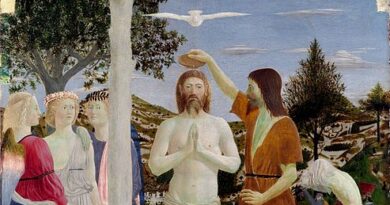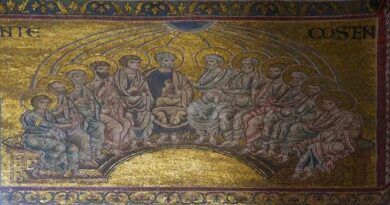Third Sunday of Easter/B
Massimo Palombella

In today’s Gospel (Lk 24:35-48) Jesus, after the Resurrection, presents Himself to the two disciples who have returned from Emmaus, to the Eleven and to those who were with them, exclaiming “Peace be with you!”.
It is interesting to note that the first thing Jesus announces and gives is ‘peace’, an instance that, on close reading, is very far from the idea of ‘peace’ that, perhaps, we have implicitly codified in our lives. In fact, ‘peace’, for many of us, is the absence of problems, tranquillity, serenity, equilibrium, and this condition is to be sought and, once conquered, to be ‘maintained’.
The peace that Jesus communicates is very far from what has just been described.
It is a peace where there is no “stability”, where there are no “certain and sure” things, but a continuous movement and change to serve the Truth. A process where “in a house of five people will be divided three against two and two against three; father against son and son against father, mother against daughter and daughter against mother, mother-in-law against daughter-in-law and daughter-in-law against mother-in-law” (Lk 12:51-53).
In essence, the ‘peace’ that Jesus gives is not something to be ‘conquered and maintained’, but is identified with the very process of a life where we are continually called to seek the Lord, the Truth, and thus to move, change, find new ways, experiment, try, fail and begin again: basically, ‘to really live’.
So, true ‘peace’ is found by facing change, moving, separating, living in ‘reality’, exactly as the Eleven were called to do after the Resurrection. From being disciples, following one person, they had to become independent, autonomous, able to discern, to lead, to be their own ‘teachers’.
In essence, the Apostles had to move from an ’emulation’ of Jesus to a ‘declination’ of him in the various historical and cultural contexts where they were called to act. This process required from them was not easy. It demanded necessary and painful separation from Jesus himself, a separation through which the true and vital personalisation of every relationship is realised.
The God of “certain and sure” things does not exist, it is often an invention of ours to stay quiet, to not face reality.
The true God challenges us on the quality of our lives, He waits for us in reality, in situations where, not without travail, the best of us are stimulated to live.
The communion antiphon of today’s celebration is taken from Psalm 95 (Ps. 95:2) with the following text:
“Cantate Domino, alleluia:
cantate Domino, benedicite nomen ejus:
bene nuntiate de die in diem salutare ejus, alleluia, alleluia.”
(Sing unto the Lord, alleluia;
sing to the Lord, bless his name;
proclaim his salvation day after day, alleluia, alleluia.)
The attached music, in Gregorian Chant, is taken from the Gradual Triplex published in Solesmes in 1979. The interpretation is by the Choralschule der Benediktinerabtei Münsterschwarzach conducted by Godehard Joppich. The music track can be found on the CD Gregorian Chants published in 2020 by Christophorus.
A blessed Sunday and heartfelt greetings.


